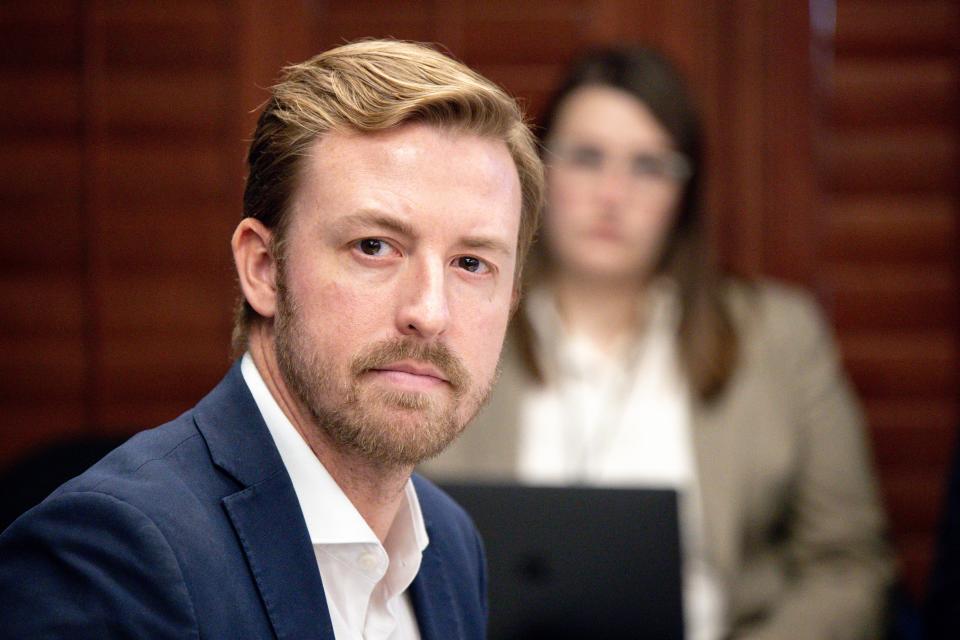Amid Ryan Walters drama, Oklahoma Legislature ready to raise funding for schools

The drama surrounding seemingly every move of state schools Superintendent Ryan Walters since he took office in January 2023 often has overshadowed successful efforts in the Legislature to increase funding across the board for education in Oklahoma.
Last year, common education, higher education and CareerTech — the three major legs of the state’s education system — each received financial boosts, and the appetite appears to be there to increase funding even more during the upcoming legislative session that will begin Monday.
Although Walters hasn’t asked for more money for common education — his budget request of $3.92 billion was slightly lower than the $3.97 billion appropriated last year — legislative leaders are searching for ways to boost teacher salaries and make sure top teachers are eligible to see even larger salary increases.
State higher education regents have asked for a record amount of money — $1.126 billion — and have high hopes about $200 million will be allocated toward what they say are about $1.5 billion in deferred maintenance needs across the state system’s 25 colleges and universities. CareerTech, meanwhile, is asking for a 26% funding increase, as the system grapples with how to address a waiting list that’s grown to about 7,500 students.
K-12 schools budget drama hasn't been as thick this year — so far
Legislators annoyed with Walters and his chief adviser, Matt Langston, cut them out of budget negotiations last year, but with Langston conspicuously absent, Walters’ pre-session budget presentations to House and Senate committees went smoothly. Walters’ biggest ask this year is for $60.55 million for what he’s dubbed as his “Back To Basics” plan, of which he said $48.25 million would go directly to teachers.
The plan would involve $10 million to continue a signing bonus program to bring teachers into Oklahoma. The goal, Walters said, would be to attract as many as 650 secondary-school-level teachers in math and science.

But issues within the bonus program surfaced last month when two nonprofit news agencies reported on the Oklahoma State Department of Education's efforts to claw back bonuses to teachers that the agency approved in error. Walters has not accepted responsibility for the mistake, instead blaming the teachers involved and lambasting media outlets for their coverage of the issue, saying they have “actively lied” about it. Walters’ actions have caused concern among legislative leaders who might otherwise be interested in expanding the bonus program.

Walters also wants $15 million to expand a statewide tutoring program focused on improving reading and math test scores. Under the concept, teachers would earn $50 an hour to work as after-hours tutors. He’s also proposing to award $22 million in “growth” bonuses, which essentially would be incentive pay for teachers whose students had shown gains in reading and math.
His request also includes $9.05 million for teacher training in reading, math, science and history, and $4.5 million for a "statewide screener," a mid-year test administered to students, and an online early warning and intervention system.
Could more money for teachers be on the horizon?
Last year, the Legislature approved a package that added $625 million for public education. Of that amount, $286 million went to support teacher pay raises. Rep. Mark McBride, R-Moore — the chair of the House’s education subcommittee on appropriations and budget — said he’s not opposed to doing even more this year.
Sen. Adam Pugh, R-Edmond, the chairman of the Senate education committee, said he’s prepared to make changes to encourage school districts embrace the “Teacher Empowerment Plan” he championed last year. During Walters’ testimony to that Senate committee, the superintendent said only about $225,000 of the $22 million allocated for the program has been used and only 12 of the state’s more than 500 school districts have applied.
The program is designed to reward teachers designated by their district administrators as outstanding with raises ranging from $3,000 to $40,000, but there are two catches — one, the district must pay for half of the increased salary, and two, districts are limited to having up to 10% of their teachers receive the raises.
Pugh, who said he was sponsoring legislation to try to eliminate the first catch, is frustrated that more school district superintendents haven’t bought into the program.
Pugh also is sponsoring bills that would rework Oklahoma’s Reading Sufficiency Act, which is aimed at improving literacy for early readers. He proposes creating a revolving fund that would help both higher education and CareerTech address the state’s workforce needs and recruit military veterans to combat Oklahoma’s teacher shortage. He’s also interested in bills, proposed by his committee members, that would address cellphone usage in schools, promote school security measures and limit the use of so-called “virtual” days by school districts.
Percentage-wise, CareerTech made the largest request for a budget increase. Director Brent Haken told senators if they granted his budget request of $201,956,568, CareerTech would be able to essentially wipe out most of its current waiting list within the next three years.
In addition to funding bills, legislators will be asked to approve a slew of educational rules changes being proposed by the state Board of Education, led by Walters. The proposed changes include alternative education standards, recognition of a person’s preferred pronouns, and new standards for information literacy and personal financial literacy, among others.
What about funding requests for higher education and CareerTech?
On the higher-ed side, hopes are high that increases in funding seen in recent years will continue after years of cuts. From 2016 to 2018, the state appropriation to higher education was cut by more than $250 million as the state grappled with budget shortfalls. In 2018 alone, higher education absorbed a 6% budget hit, and that came after a 16% cut the year before.
But by 2023, state appropriations for Oklahoma’s higher education system increased by 7.45% to $873.4 million, and it rose to slightly over $1 billion for the current year. State higher education regents have requested a 12.2% increase from the Legislature to $1.13 billion for the next yearly budget. House Speaker Charles McCall, R-Atoka, told regents in December the relationship between regents and the Legislature “is the strongest it’s ever been.”
As for deferred maintenance issues, Senate President Pro Tem Greg Treat, R-Oklahoma City, told regents in December “(t)here is real opportunity in infrastructure investment in one-time money” this year, and Pugh confirmed that the issue is on his committee’s radar.
That amount would be a jump of $41.75 million over CareerTech’s state appropriation for the 2024 fiscal year. Pugh said he’d like to target specific areas of CareerTech that are showing significant growth and eliminate areas of duplication within the system.
The CareerTech system offers programs and services in 29 technology center districts operating on 59 campuses, 391 pre-K through 12 comprehensive school districts, 16 skills centers campuses, and 32 adult education and family literacy providers.
This article originally appeared on Oklahoman: Oklahoma schools may get more funding in 2024 legislative session

